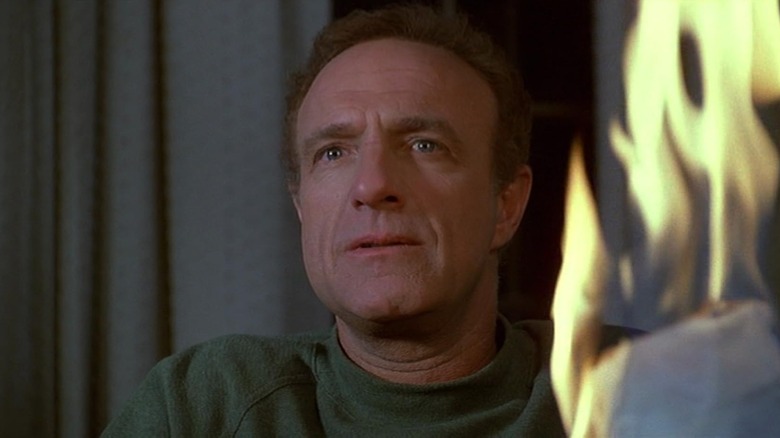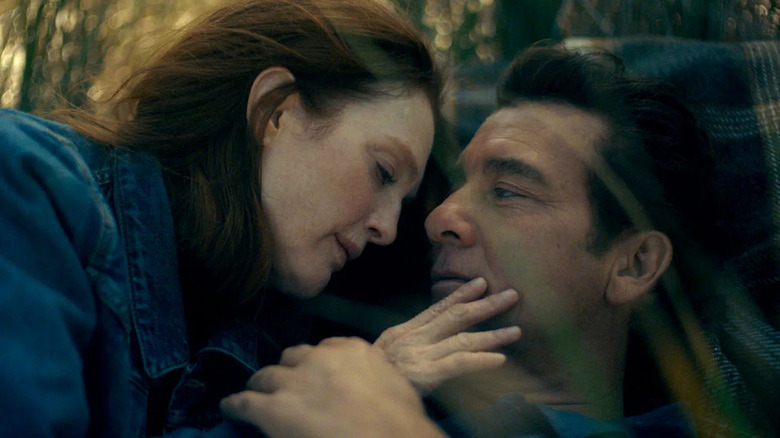The Three Stephen King Books The Author Would Save In A Fire
We may receive a commission on purchases made from links.
Stephen King has written over 60 novels and hundreds of short stories. You'd think it'd be an impossible question to ask King to pick between them, but surprisingly he's got a few clear favorites among the massive pile. When asked in a 2019 Guardian interview which books he'd save from having all their copies burned in a fire, King didn't hesitate. "Dumb question, but I'll play," he said. "'Lisey's Story,' 'The Stand,' and 'Misery.'"
The answer surprised some fans at the time, mainly because the three books don't have much in common. "Lisey's Story" is a low-key drama about a widow reflecting on her relationship with her late husband; it's a relatively slept-on novel that didn't make /Film's top 10 best Stephen King books ranking. "The Stand," meanwhile, is a grand epic about a deadly pandemic that evolves into a biblical war between good and evil, whereas "Misery" is about a writer who finds himself trapped in a house with a homicidal, obsessive fan. So, what's special about these three novels? King didn't explain his picks in the 2019 interview, but luckily we have a few more interviews from him to work with.
Of the three, King's love for "Misery" is the easiest to understand. The book is about a successful novelist who starts off frustrated that his genre fiction isn't respected among the literary world, only to find himself held captive by a woman who claims (quite earnestly) to be his biggest fan. Most of King's books are scary, but this tale is designed to be scary specifically to any writers or artists in the audience. Most artists want to have fans, but not this type of fan.
"There was a guy begging for an autograph, but we were running super late," King explained in a Washington Post article at the time "Misery" released. "'I'm your biggest fan!' he said. 'I've read all your books!' I jumped in a car and he started saying, 'You, you stupid son of a b***h.' The line is so thin between 'I love you' and 'I hate you.'" Other inspirations for "Misery" include the backlash King received in 1984 for his family-friendly fantasy novel "The Eyes of the Dragon," as well as his struggles with sobriety.
"Misery" is not the first time Stephen King has written about writer protagonists or protagonists with drug problems, but this book combines the two in a way that feels particularly personal. It's never been easier than it is here to view a King protagonist as an author insert, which helps the book feel extra introspective without ever bogging down the suspenseful main story.
So, is "Misery" worth reading? Yes, definitely. It's one of King's most exciting premises, combined with some of the sharpest, most evocative prose of his career. And although fans often complain about how King is sort of bad at writing endings, nobody's ever accused "Misery" of sharing the same problem.
Why Stephen King would save Lisey's Story
Although "Lisey's Story" is rarely anyone's favorite King novel, it's pretty obvious why King himself loves it: the book is about his wife Tabitha, aka the woman who convinced him not to toss out his manuscript of "Carrie" and who later supported him while he struggled to stay sober. Tabitha also reads all of King's drafts and provides editorial feedback, and she was his biggest supporter long before he became famous. "She'd read my stuff and felt certain I'd someday support us by writing full-time," King said in a 2003 speech. "Tabby always knew what I was supposed to be doing, and she believed that I would succeed at it."
In the recent editions of "Lisey's Story," there's a Q&A at the end where King is asked about the book, as well as his role in writing the recent Apple TV+ mini-series adaptation. Responding to the opening question, he explained that much of the novel was based on his real-life experience:
"I had double pneumonia around the year 2000 and came really close to stepping out. When I came home from the hospital, my wife had cleaned out my study completely. She wanted to repaint it and redecorate it, or something like that, and when I went in, she said, 'Don't go in there! You won't like what you find!' So of course I went in there, {laughs} and it was empty. All the books were gone... I thought to myself, 'I've died. I'm a ghost.' I really, for a minute, thought that; 'I'm haunting my old study, and this is what it looks like.' The idea for 'Lisey's Story' came from that and from wondering how my wife would act without me."
This is hardly King's first novel with an author as a major character, but it is one of the first times we've gotten a story that's pretty much entirely from the author's wife's point of view. The results is a very touching, semi-autobiographical novel, one that delves deep into the weird complicated intimacy of married life.
Is "Lisey's Story" worth the read? I'd say yes, although I'd particularly recommend the audiobook read by Lindsay Crouse, who manages to make the somewhat awkward "marriage talk" dialogue between Scott and Lisey feel a lot smoother. The pacing in "Lisey's Story" is also far more relaxed than the typical King novel, lending itself well to a listening format.
Why Stephen King would save The Stand
Of King's three picks, "The Stand" is the most obvious. It's perhaps the most ambitious novel of his, a 1,000+ page epic that sharply imagines exactly how a deadly pandemic might play out in America. The contagious illness in this book has a 99.4% kill rate, leaving the .6% of survivors to figure out how to pick up the scraps for a new civilization. It also features a massive cast of compelling characters whose storylines all start to collide in fascinating ways around 400 pages in. A solid TV adaptation of this book has never been achieved yet — well, the 1994 mini-series was okay I guess — but we can certainly understand why Hollywood keeps trying.
What makes "The Stand" extra special among King novels is that it's one of the few he's gotten a second shot at. Because King was a relatively new author back in 1978, the first edition was "only" 823 pages, with King's editor basically forcing him to leave 400 pages on the cutting room floor. This never sat well with King, so in 1991 (when he'd grown so acclaimed that he could do pretty much whatever he wanted) he republished the book at 1,152 pages, and adjusted the timeline so the book was set in '91 instead of '80.
Some fans argue that the original version was better, that it avoided any "fluff" or "filler." In the foreword to the '91 edition, King gave his response to that critique: "I think that in really good stories, the whole is always greater than the sum of the parts." He proved this by giving a barebones summary of the "Hansel and Gretel" children's story, following it up with, "For me, that version's a loser. The story is there, but it's not elegant. It's like a Cadillac with the chrome stripped off and the paint sanded down to dull metal. It goes somewhere, but it ain't, you know, boss."
In the same forward, King admits that "The Stand" has "never been my favorite novel," so why would he want to save it from a fire 30 years later? As King put it, "It is the one people who like my books seem to like the most." With the COVID pandemic giving it a surprise boost in relevance, "The Stand" has definitely maintained its standing as one of King's most widely known and beloved works.
So, is "The Stand" worth reading? As someone who read it at 12-years-old and developed a life-long fear of the Lincoln Tunnel as a result, I'd say it's worth a go.


